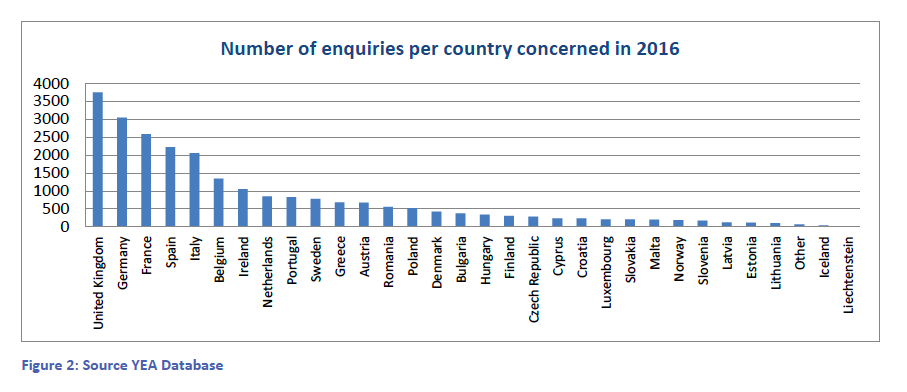Brexit: three categories of people at risk you haven’t heard about
Enquiries from the UK to a EU legal service about citizenship and free movement rights have spiked since the EU referendum. Almost a fifth of the questions taken in 2016 by Your Europe Advice, an information service to citizens and businesses, came from the UK. The type of enquiries also highlight the topics of concern.
Your Europe Advice helps understand free movement rules and what to do in case of problems through a network of more than 60 lawyers. Overall, the majority of enquiries they received in 2016 were about social security (24%), formalities to enter another EU country (19%) and residence rights (17%).
Social security has always featured among the top concerns, says the report analysing the data. The novelty this year is the increase in the number of requests coming from the United Kingdom. More than 3,500 (18%) of the 20,491 enquiries dealt with in 2016 were from the UK, according to European Citizen Action Service (ECAS), the non-profit organisation operating the service on behalf of the EU Commission.

“These figures show that even if EU legislation is in place, it does not mean it is fully applied in practice. There are already implementation gaps at national level and now Brexit creates further uncertainty,” explains in this interview Marta Pont, ECAS outreach manager.
Who is most exposed to the loss of rights due to Brexit?
“Brexit poses a problem for EU nationals living in the UK and British citizens living in other EU countries, because their current rights are subject to the withdrawal agreement and the future UK-EU relation. Another group, which is seldom discussed, are British citizens in the UK. Even those who will never move abroad and do not feel the impact of being EU citizens are at risk of losing out, for example with regard to employment rights, environmental rights or passengers rights deriving from EU laws. These will be maintained in British legislation after the Great Repeal Bill, but nothing will prevent the UK from limiting or amending them in the future.”
Are there any groups of people or rights that need more attention in the Brexit discussion?
“There are several. A key area is about family rights. The EU citizenship directive grants free movement rights (i.e. entry, residence, work etc.) to family members of EU citizens, whether they are European or third country nationals. For example, a Colombian married to a British citizen living in Spain would benefit. With Brexit, these rights are under threat as free movement rights of family members initially depend on the family link with the EU mobile citizen. The implications for people from non-EU countries deserves closer attention.
Another disregarded aspect concerns those who exercise so-called ‘derivative’ rights of residence, for example carers of disabled people. Primary carers have derivative residence rights which are dependent on the right to reside of the person they are in charge of.
The rights of past residents – EU nationals who used to live in the UK and then moved to another EU country or UK citizens who did the same elsewhere in the EU – are also at stake.”
When countries do not comply with EU laws they can be referred to the European Court of Justice. But if its jurisdiction no longer applies to the UK, who will guarantee the rights of EU citizens living in Britain in the future?
‘Theresa May promised to put an end to the European Court of Justice’s jurisdiction in the UK, but this claim was not specified in the letter triggering article 50, so this promise may be recalibrated, perhaps allowing a non-binding or partial role of ECJ rulings in the future EU-UK arrangement. EU institutions seem to be united in saying that the withdrawal treaty is an EU instrument which would be subject to the jurisdiction of the ECJ.
Another solution would be to include provisions in the withdrawal treaty that would require UK courts to give effect to the acquired rights of citizens and to interpret them in the light of the European Court of Justice’s case law. Alternatively, the withdrawal treaty and/or the future trade agreement could provide for a joint committee tasked to resolve differences within its remit. Switzerland already has a similar arrangement with the EU.”
Claudia Delpero © all rights reserved.
Photo courtesy Pixabay.




